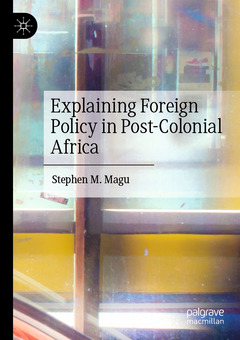Explaining Foreign Policy in Post-Colonial Africa , 1st ed. 2021
Auteur : Magu Stephen M.

This book explores foreign policy developments in post-colonial Africa. A continental foreign policy is a tenuous proposition, yet new African states emerged out of armed resistance and advocacy from regional allies such as the Bandung Conference and the League of Arab States. Ghana was the first Sub-Saharan African country to gain independence in 1957. Fourteen more countries gained independence in 1960 alone, and by May 1963, when the Organisation of African Unity (OAU) was formed, 30 countries were independent. An early OAU committee was the African Liberation Committee (ALC), tasked to work in the Frontline States (FLS) to support independence in Southern Africa. Pan-Africanists, in alliance with Brazzaville, Casablanca and Monrovia groups, approached continental unity differently, and regionalism continued to be a major feature. Africa?s challenges were often magnified by the capitalist-democratic versus communist-socialist bloc rivalry, but through Africa?s use and leveraging of IGOs ? the UN, UNDP, UNECA, GATT, NIEO and others ? to advance development, the formation of the African Economic Community, OAU?s evolution into the AU and other alliances belied collective actions, even as Africa implemented decisions that required cooperation: uti possidetis (maintaining colonial borders), containing secession, intra- and inter-state conflicts, rebellions and building RECs and a united Africa as envisioned by Pan Africanists worked better collectively.
Stephen M. Magu’s research focuses on international political economy, economic development, governance and foreign policy issues as relating to Africa. He is the author of Great Powers and US Foreign Policy towards Africa (2019), Peace Corps and Citizen Diplomacy: Soft Power Strategies in U.S. Foreign Policy (2018) and The Socio-Cultural, Ethnic and Historic Foundations of Kenya’s Electoral Violence: Democracy on Fire (2018), and co-editor of Corruption Scandals and their Global Impacts (with Omar Hawthorne, 2018).
Takes an institutional and continental approach to analyzing the major issues in post-colonial Africa
Studies the conditions that made African countries decide to keep the colonial boundaries even though each country hated them
Captures the importance of the early years of independence, especially with decolonization of the remaining countries in southern Africa, the Apartheid government, and Ian Smith’s Rhodesia
Date de parution : 01-2022
Ouvrage de 349 p.
14.8x21 cm
Disponible chez l'éditeur (délai d'approvisionnement : 15 jours).
Prix indicatif 126,59 €
Ajouter au panierDate de parution : 01-2021
Ouvrage de 349 p.
14.8x21 cm
Disponible chez l'éditeur (délai d'approvisionnement : 15 jours).
Prix indicatif 126,59 €
Ajouter au panier


